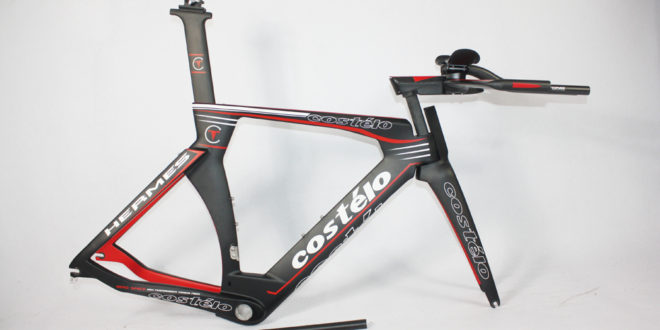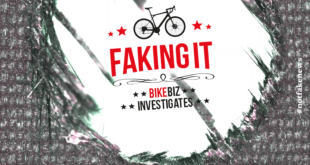“Buy Smart. Buy Direct.” That’s the tagline on Chinese e-tailer DHgate.com, suggesting that you’re buying factory-direct, cutting out the expensive middleman. A search for “road bike” brings up thousands of items, with Cipollini and Cervélo carbon bikes at the top of the list, and at amazing prices. In a sidebar there’s an offer for a Skot Scale MTB frame. A Skot Scale? Surely DHgate means Scott Scale? Oh well, easy mistake to make, let’s get back to looking at the bargains on offer. For $1900 there’s a Pinarello Dogma, complete with Sky-branded aero seat-post, carbon F8 handlebars, Di2 groupset and deep-dish Dura-Ace carbon wheels.
This stunning “factory price” is from Leadercycling. The address given for this “factory” – which, says the DHgate listing, was founded in both 2008 and 2013 – is simply Guangdong province, China. A Google search for “Leadercycling” retrieves only the listing on DHgate. More than 500 people have bought from this “premium”-level merchant, says DHgate, and Leadercycling has had 99.3 percent positive feedback.
NOTE: The International Trademark Association’s Chinese Anticounterfeiting Committee says “for a fee, many platforms provide verification seals and badges and high search placement to make a seller seem more trustworthy than it is.”
Leadercycling’s transactions and the positive feedback may or may not be real, but the “factory direct” products on offer are definitely fakes. Leadercycling is a merchant. At any one time, there are three thousand or so such cycle-based Chinese trading companies vying for business on Chinese e-tail malls such as Alibaba, Aliexpress, DHgate, and US-based apps such as Geek.
Not all of these merchants are separate concerns – some have multiple business names, making it easier to roll over and play dead when necessary. Whittle them down and there are perhaps a few hundred merchants selling cycle stuff.
These merchants buy their goods from the Competent and Cowboy factories. Many of the carbon frames on offer are open-mold designs that don’t infringe on any design rights; some most definitely infringe. The online malls do their best to police their listings but with so many moles it’s tough to whack them all.
In a 2014 filing with the US Securities and Exchange Commission the Alibaba Group wrote:
“Although we have adopted measures to verify the authenticity of products sold on our marketplaces and minimise potential infringement of third-party intellectual property rights through our intellectual property infringement complaint and take-down procedures, these measures may not always be successful.”
Alibaba removes 120 million suspect listings each year. The group’s online malls have seven million merchants offering 800 million items – ranging from cosmetics to swimwear, and from electronics to sunglasses. Of the 60,000 Dahon folding bikes for sale on Alibaba’s sites, half are fakes or infringe Dahon’s design rights. Taiwan-based Dahon spends more than $200,000 a year to combat counterfeiters.
Alibaba only launched in 1999, yet its merchants racked up nearly $400bn in sales in 2014. It went public on the New York Stock Exchange in 2014, in the richest-ever “initial public offering”.
The company says it spends more than $16m a year on 2,000 staff tasked with whacking the moles. But the moles keep coming back. “Counterfeiting is a cancer,” Alibaba founder Jack Ma has said.
Brands that spot fake products on the online Chinese malls can get them removed by submitting “take-down” requests.
In a 2012 filing connected with its IPO, Alibaba said it took seven to 10 days for its websites to process takedown requests, although the process is shorter for brand owners or IP tracking firms who achieve “Good faith complainant” status by storing their trademarks, design rights and brand names on Alibaba’s servers.
“Most of the times, the counterfeits are removed within one day from the take-down request,” Convey’s Michele Provera told BikeBiz. (Convey is an IP protection firm and works for brand owners such as Pinarello, Castelli, SMP and 30 or so others.)
Algorithms can easily spot the fraudulent use of brand names, so merchants get around this by not listing them. Instead, they will place photos of, say, Pinarello frames next to listings that, to an algorithm, look as though they’re connected with plain carbon bikes. It’s up to brand owners – and trackers such as NetNames, MarkMonitor and Convey – to spot the use of such photos. Some of the photo tracking can be done with image recognition software, but the fakers can obscure them enough to throw sniffers off the scent. Many of the photos have to be spotted, and flagged, manually. The fakers can often post new listings, from newly named merchants, quicker than the offending ones can be taken down.
Aliexpress has a smartphone shopping app, but it’s not the only one. Wish Inc., of San Francisco, has the Geek app – this connects Western consumers with Chinese sellers of mostly no-name electronics and clothing. Wish Inc., is valued at $3bn and – via Geek and Wish.com – says it has 300 million customers. The company was founded in 2011 by Peter Szulczewski and Danny Zhang, former engineers at Google and Yahoo respectively. The Geek app is only five years old. It is heavily promoted with Facebook ads.
“Get trending products at 50-80% OFF what you would pay at your local stores,” promises the app.
“We go directly to the manufacturers to get you the best deals on stuff you want,” says the app which has lots of no-name LEDs and other crappy Chinese bike parts but despite the parent company saying it has “a strict zero-tolerance policy against counterfeit product listings” BikeBiz was able to locate a fake carbon 3T seatpost for £12. If bought within an hour of showing interest, it could have bagged it for £10. Shipping would add another £16, but that would still be a whopping “saving” of £114. (Shipping from China can take 2-3 weeks, not something the app promotes.)
Unlike Alibaba and the rest, Geek does not list the name of the merchant, not even at the checkout. When BikeBiz accessed the fake seatpost via Wish.com the merchant’s trading name was shown – Early Light – but no other details were provided.
The fake 3T stem was not being sold “direct from the manufacturer”: Early Light is a merchant selling an eclectic range of general goods, including headphones, fishing tackle and lots of plastic tat.
The likes of Geek, DHgate, AliExpress and others make it easy for Western consumers to buy from China. The “direct-from-the-Chinese-factory” websites and apps are distorting the marketplace, making it appear that retailers of genuine products are gouging consumers. For consumers, it’s caveat emptor, buyer beware.
“Counterfeiters are able to remain anonymous in virtually every aspect of online counterfeiting,” warns the International Trademark Association’s (INTA) Chinese Anticounterfeiting Committee:
“Registering a domain name, maintaining a website or selling page on a platform, accepting orders, shipping packages, and processing payments can be performed using false or incomplete names making identification and capture by law enforcement or the brand extremely difficult. A seller’s real identity is not available to consumers or brand owners.”
The committee adds: “Trading platforms and online service providers and intermediaries are lax in verifying that sellers are using accurate seller information. The information that registrants of counterfeit stand-alone websites sites provide for the WHOIS database is generally false or incomplete.”
And even when consumers receive goods they may not be able to contact the supplier should any faults be found, warns the committee:
“Shippers and express couriers often do not require senders to supply correct or complete return addresses. Counterfeit goods are generally shipped with a fake or incomplete return address via EMS China, China Post or another courier. This anonymity makes it impossible for brands or law enforcement, especially in foreign countries, to locate the sender. Privacy laws in China further stymie the ability to discover the identities of the counterfeiters.”
It’s entirely possible that the Cowboy factories – and the merchants who buy from them – won’t always be rogue traders. In time – and with disincentives, such as fines and prison terms – they may start to develop their own IP for their brands. This seems to be in line with the Chinese government’s stance on counterfeiting: to officially discourage it but also to hope that the skills being acquired will eventually lead to the creation of innovative businesses that no longer need to copy Western ideas. However, prison sentences are rare, and the fines handed out to fakers are low.
INTA’s Chinese Anticounterfeiting Committee says: “[The Chinese authorities] impose sanctions of up to seven years imprisonment where sales of infringing products are deemed “huge” or up to three years where they are “relatively large” or where “serious circumstances” are deemed to exist. Fines are usually $8,000, says INTA’s committee, adding that “Chinese police will generally only commence investigations into cases where there is a strong possibility that [evidence] thresholds can be met following investigations. As a consequence, online infringers generally attempt to avoid keeping evidence of sales over the relevant thresholds, which they are able to do by keeping low inventories and locating fulfillment separately from operation and maintenance of the websites.”
At its 2017 “brand rights holders day” in Beijing, the Alibaba Group unveiled enhancements to its Intellectual Property Protection platform. In the first month since the “express” technology enhancements were made, almost all cases submitted by rights holders were handled and closed within 24 hours, claimed the Chinese company.
Alibaba’s IP Protection Platform is used by brands and IP owners to flag and request the take down of counterfeit or IP-infringing product listings.
The platform includes automated complaints-processing, analysis, and a product-authentication system powered by new algorithms and data models. The company has also hired more staff to combat the proliferation of fakes.
Alibaba now stresses it has optimised brand-protection technological capabilities, including multi-lingual trademark-recognition and improved search engine optimisation for easier discovery of and access to the IPP platform.
Of the complaints received by Alibaba, 96 percent are now handled and closed within 24 hours, claimed the company. 83 percent of the listings were also taken down. The remaining 17 percent were left online for reasons such as insufficient evidence to prove infringement or a mismatch between the complained listing and IP documents filed.
“Brand trust is core to our mission,” said Jessie Zheng, Alibaba’s chief platform governance officer. “Our enhanced platform, along with significant progress in other important initiatives all showcase the industry best practices Alibaba is creating for the benefit of all our stakeholders.”
Earlier in 2017 Alibaba created the Alibaba Anti-Counterfeiting Alliance, a collaboration between Alibaba and 30 international and Chinese brands that leverages big data and the latest technologies to enable a cooperative, global, 24-hour anti-counterfeiting network.
Via “Cloud Sword Alliance,” a partnership with provincial governments of 13 Chinese provinces, Alibaba is now providing law-enforcement bodies with data to track down and prosecute criminal rings and activities. The technology behind Cloud Sword is able to track not just illegal transactions, but also trace them upstream to the production source.
Since 2016 Alibaba has said it has been cracking down on merchants who attempt to mislead consumers through misappropriation of branded keywords in the titles of product listings. Alibaba continues to use advanced algorithms to identify, block and remove them and root out repeat offenders, said the company.
Faking it – Inside the shady world of counterfeit bikes, clothing and parts is a series of 20 articles. For offline reading convenience the 25,000 words can be found on an illustration-rich PDF, a Kindle file, an eBook and a Word document.
 BikeBiz Bicycle and cycling retail news
BikeBiz Bicycle and cycling retail news




